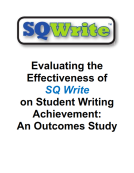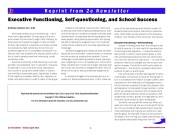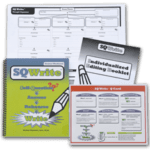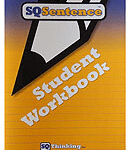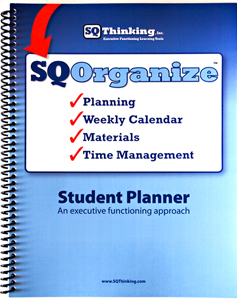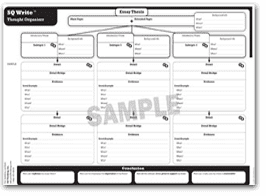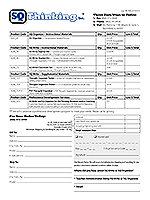Research
SQ Organize
SQ Organize applies research-based executive functioning skills to develop 21st-century students who independently initiate, self-monitor, and complete homework. Executive functions are developmental skills that guide students in achieving specific goals. SQ Organize explicitly teaches students to purposely plan and complete homework by breaking tasks down into distinct and manageable sequenced parts.
| Executive Function | Definition | Development within SQ Organize |
|---|---|---|
| Working Memory | Hold information in mind while performing complex tasks. | SQ Organize provides a detailed visual record of homework planning, decreasing working memory load. |
| Emotional Control/Stress Tolerance | Manage emotions to achieve goals. | SQ Organize provides students with simple, predictable routines. This roadmap increases predictability, reducing feelings of being overwhelmed. |
| Prioritizing & Planning | Create a roadmap to reach a goal or complete a task. | Prioritizing order and estimating time per assignment leads to a roadmap. This time management plan supports task completion. |
| Organization | Create and maintain systems to track information. | SQ Organize tracks assignments, responsibilities, and materials in an organized manner. |
| Time Management | Estimate time, allot efforts, and stay within time parameters. | Students develop and follow an organized, predictable daily time management plan. |
| Response Inhibition | Think before acting. | The SQ Organize three-routine system keeps students focused on a predetermined set of steps to help prevent “jumping in ” too fast. |
| Goal-Directed Persistence | Have a goal, follow-through, minimize distraction. | Students know the ultimate goal is the development of the daily time management plan. |
| Metacognition | Self-monitor: Provides a big-picture view of progress toward a goal. | The time management plan provides an overarching view of one’s daily tasks and goals. |
SQ Organize fosters homework independence by directly teaching students to develop to-do lists, manage materials, record and prioritize homework assignments, and estimate assignment completion times. By generating a daily homework time management plan, students feel in control and empowered because the plan is organized and predictable. With increased empowerment, homework procrastination decreases and assignment completion increases.
Self-Questioning (SQ)
Self-Questioning is an active process of “self-talk” that guides student actions. With self-questioning, students become self-reliant thinkers and planners who initiate tasks on their own. The SQ Organize three-routine system directs students through a daily self-questioning system. Students self-question and self-monitor school work at three strategic times: at the beginning of each week, at the end of each class, and at the end of each school day.
Whole-to-Part Analysis
Whole-to-part analysis breaks the SQ Organize three-routine system into manageable categories and steps. Because it is easier to work on small categories, initiation increases and procrastination is minimized.
SQ Organize includes 4 Components
- Planning: organizational routines
- Weekly Calendar: assignments, assessments, non-academic tasks
- Materials: to bring home each day per assignment
- Time Management: daily after-school plan
Sequenced Steps > > Confidence & Independence
Homework anxiety usually occurs because students do not have a plan to begin homework, do
not know the order to work on assignments, do not know the time required to complete each assignment, and do not know when they will finish homework each night. All this uncertainty leaves students feeling overwhelmed and more likely to procrastinate.
Students must be able to verbalize their homework plan. If students can’t say the plan, it is unlikely that they will be able to execute the steps to complete the plan. SQ Organize develops confident and independent students by directly teaching them to record and prioritize the order of assignments, estimate the time to complete each assignment, and generate a daily time management plan that indicates when to start and finish homework assignments and other activities.
The SQ Organize time management plan informs students by providing a “picture” of their after school time. Students are often surprised to “see” that they have fewer tasks to complete than they thought, increasing motivation. After-school hours are now more predictable because students
can see the bigger picture. They know when they will have time for leisure activities, so their anxiety and homework procrastination decreases and their assignment completion increases.
SQ Write
| Executive Function | Definition | Development within SQ Write |
|---|---|---|
| Inhibit | Control one’s own thoughts and actions | The Thought Organizer keeps students on a -predetermined writing path and helps prevent rambling. |
| Shift | Think FLexibly and move freely from one idea or activity to another | Self-questioning helps students to think exibly. The Thought Organizer identi es all the parts of the whole writing product, allowing students to move between ideas and activities without effort. |
| Emotional Control | Modulate emotional responses with rational thought | Self-questioning provides students with a simple process to develop thoughts so that they don’t become emotionally overwhelmed. |
| Initiate | Begin a task and independently generate ideas | Students easily generate ideas through self-questioning. The Thought Organizer identi es all parts of the writing process so that students know how to begin composing sentences. Verbal rehearsal makes writing easier because students already have a mental imprint of the essay. |
| Working Memory | Hold information in mind in order to complete a task | The Thought Organizer, Q Card, essay worksheets and Individualized Editing Booklet (IEB) provide students with visual records of their work, decreasing the load on working memory. |
| Planning/ Organization |
Grasp main ideas and manage current and future tasks | Self-questioning helps students identify and convey main ideas. The Thought Organizer ensures that students manage work flow. |
| Organization of Materials | Impose order on work | The Student Workbook contains a folder to hold all materials and helps keep students organized. The Q Card helps students effectively ask self-questions while the Thought Organizer and essay worksheets help them organize, resulting in answers and subsequent sentences and paragraphs. |
| Self-Monitoring | Check work and monitor one’s own performance | Verbal rehearsal provides students with auditory feedback to hear if sentences sound right. Essay worksheets help ensure that students include all information needed in a detailed, complete essay. The IEB is an authentic editing tool that enables students to easily record prior writing mechanical errors so that they can avoid repeating them. |
White Papers
SQ Organize
SQ Organize applies research-based executive functioning skills to develop 21st-century students who independently initiate, self-monitor, and complete homework. Executive functions are developmental skills that guide students in achieving specific goals. SQ Organize explicitly teaches students to purposely plan and complete homework by breaking tasks down into distinct and manageable sequenced parts.
| Executive Function | Definition | Development within SQ Organize |
|---|---|---|
| Working Memory | Hold information in mind while performing complex tasks. | SQ Organize provides a detailed visual record of homework planning, decreasing working memory load. |
| Emotional Control/Stress Tolerance | Manage emotions to achieve goals. | SQ Organize provides students with simple, predictable routines. This roadmap increases predictability, reducing feelings of being overwhelmed. |
| Prioritizing & Planning | Create a roadmap to reach a goal or complete a task. | Prioritizing order and estimating time per assignment leads to a roadmap. This time management plan supports task completion. |
| Organization | Create and maintain systems to track information. | SQ Organize tracks assignments, responsibilities, and materials in an organized manner. |
| Time Management | Estimate time, allot efforts, and stay within time parameters. | Students develop and follow an organized, predictable daily time management plan. |
| Response Inhibition | Think before acting. | The SQ Organize three-routine system keeps students focused on a predetermined set of steps to help prevent “jumping in ” too fast. |
| Goal-Directed Persistence | Have a goal, follow-through, minimize distraction. | Students know the ultimate goal is the development of the daily time management plan. |
| Metacognition | Self-monitor: Provides a big-picture view of progress toward a goal. | The time management plan provides an overarching view of one’s daily tasks and goals. |
SQ Organize fosters homework independence by directly teaching students to develop to-do lists, manage materials, record and prioritize homework assignments, and estimate assignment completion times. By generating a daily homework time management plan, students feel in control and empowered because the plan is organized and predictable. With increased empowerment, homework procrastination decreases and assignment completion increases.
Self-Questioning (SQ)
Self-Questioning is an active process of “self-talk” that guides student actions. With self-questioning, students become self-reliant thinkers and planners who initiate tasks on their own. The SQ Organize three-routine system directs students through a daily self-questioning system. Students self-question and self-monitor school work at three strategic times: at the beginning of each week, at the end of each class, and at the end of each school day.
Whole-to-Part Analysis
Whole-to-part analysis breaks the SQ Organize three-routine system into manageable categories and steps. Because it is easier to work on small categories, initiation increases and procrastination is minimized.
SQ Organize includes 4 Components
- Planning: organizational routines
- Weekly Calendar: assignments, assessments, non-academic tasks
- Materials: to bring home each day per assignment
- Time Management: daily after-school plan
Sequenced Steps > > Confidence & Independence
Homework anxiety usually occurs because students do not have a plan to begin homework, do
not know the order to work on assignments, do not know the time required to complete each assignment, and do not know when they will finish homework each night. All this uncertainty leaves students feeling overwhelmed and more likely to procrastinate.
Students must be able to verbalize their homework plan. If students can’t say the plan, it is unlikely that they will be able to execute the steps to complete the plan. SQ Organize develops confident and independent students by directly teaching them to record and prioritize the order of assignments, estimate the time to complete each assignment, and generate a daily time management plan that indicates when to start and finish homework assignments and other activities.
The SQ Organize time management plan informs students by providing a “picture” of their after school time. Students are often surprised to “see” that they have fewer tasks to complete than they thought, increasing motivation. After-school hours are now more predictable because students
can see the bigger picture. They know when they will have time for leisure activities, so their anxiety and homework procrastination decreases and their assignment completion increases.
SQ Write
| Executive Function | Definition | Development within SQ Write |
|---|---|---|
| Inhibit | Control one’s own thoughts and actions | The Thought Organizer keeps students on a -predetermined writing path and helps prevent rambling. |
| Shift | Think FLexibly and move freely from one idea or activity to another | Self-questioning helps students to think exibly. The Thought Organizer identi es all the parts of the whole writing product, allowing students to move between ideas and activities without effort. |
| Emotional Control | Modulate emotional responses with rational thought | Self-questioning provides students with a simple process to develop thoughts so that they don’t become emotionally overwhelmed. |
| Initiate | Begin a task and independently generate ideas | Students easily generate ideas through self-questioning. The Thought Organizer identi es all parts of the writing process so that students know how to begin composing sentences. Verbal rehearsal makes writing easier because students already have a mental imprint of the essay. |
| Working Memory | Hold information in mind in order to complete a task | The Thought Organizer, Q Card, essay worksheets and Individualized Editing Booklet (IEB) provide students with visual records of their work, decreasing the load on working memory. |
| Planning/ Organization |
Grasp main ideas and manage current and future tasks | Self-questioning helps students identify and convey main ideas. The Thought Organizer ensures that students manage work flow. |
| Organization of Materials | Impose order on work | The Student Workbook contains a folder to hold all materials and helps keep students organized. The Q Card helps students effectively ask self-questions while the Thought Organizer and essay worksheets help them organize, resulting in answers and subsequent sentences and paragraphs. |
| Self-Monitoring | Check work and monitor one’s own performance | Verbal rehearsal provides students with auditory feedback to hear if sentences sound right. Essay worksheets help ensure that students include all information needed in a detailed, complete essay. The IEB is an authentic editing tool that enables students to easily record prior writing mechanical errors so that they can avoid repeating them. |



